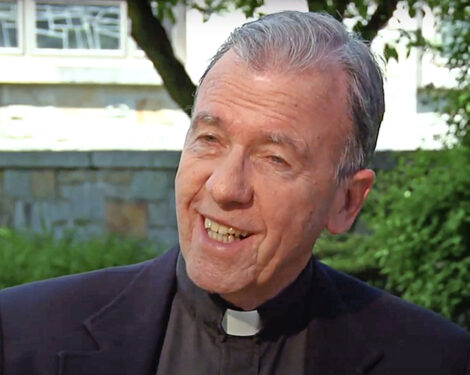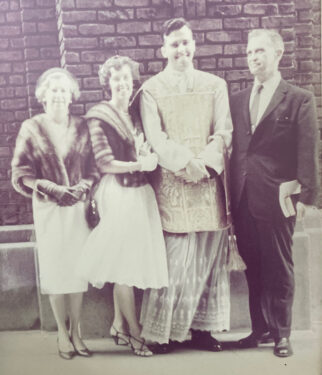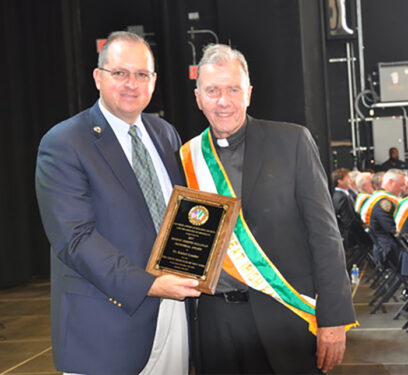
DOUGLASTON — Father Robert Lauder has authored 17 books on man’s relationship with the creator God — the cornerstone of the college-level philosophy courses that he teaches.
But the melding of philosophy and spirituality expressed in art — particularly movies — has turned this priest into a film aficionado. At St. John’s University he created a course, “Philosophy and Film.”
In class, Father Lauder shares some of his favorite movies, like “On the Waterfront,” and “A Man for All Seasons.” His goal is to get students to consider if movies can “tell us something about God.”
At 88 he still chases the sense of awe that first emerged during his youthful forays to the cinema.
“I just loved the movies,” he said. “Where I lived in Bay Ridge, there were nine movie theaters within walking distance, and every week they showed at least four movies. This is when there were double features.
“Now, I didn’t see all of them, but I certainly saw most of them. One movie I think I saw five times was ‘Knute Rockne, All American,’ and that hooked me on football. I love Notre Dame.”
Father Lauder had a scholarship to play football for Xavier High School in Manhattan, but an injury kept him off the gridiron. Meanwhile, his mind explored the confluence of philosophy and theology.

His family belonged to Our Lady of Angels Parish in Bay Ridge where the priests drew his admiration for their spiritual values. Other role models were the Sisters of Charity of Halifax who taught him in elementary school.
All of these examples, especially their fervent joy found in the Eucharist, helped inspire his vocation.
Father Lauder said he loved being a parish priest in the Diocese of Brooklyn, but he did that only four years in a career spanning six decades.
Archbishop Bryan McEntegart had other plans. In 1967, he enlisted Father Lauder to teach philosophy at the newly restructured Cathedral College of the Immaculate Conception in Douglaston.
Father Lauder was serving at St. Finbar Parish in Bensonhurst when he received a new ministry.
“It was a great four years,” Father Lauder said. “I mean, I just loved it. But he called me up and said, ‘I’m building a four-year college seminary,’ and would I go away to study to get a doctorate, so I could teach there.
“So, it wasn’t like I charted a course. I was just obeying the bishop.”
Still, Father Lauder was the right fit for his openness to the intellectual aspects of spiritual life. He first noticed that trait in another seminarian who ultimately did not become a priest, but still made an impression.
“I admired him a great deal because he was the first genuine Catholic intellectual I had ever met,” Father Lauder said. “By that I mean, there are so many devout Catholics, but this fellow seemed to allow his faith to deal with politics, art, personal relationships …
“I was so impressed by that. I connected it with philosophy, that this was a very important study.”
By the time he joined the faculty at Cathedral, Father Lauder’s appreciation of film had evolved from entertainment to art.
He was pursuing his doctorate’s degree at Marquette University when a wave of foreign art cinema reached the U.S. Included were the films of directors Ingmar Bergman, Federico Fellini, and Michelangelo Antonioni.
“I saw all of them and I just thought of them as incredibly great movies,” Father Lauder said. “Just as there are paintings that are masterpieces, poems that are masterpieces, music that are masterpieces, there are movies that are masterpieces.
“So pretty early on in my teaching, I started running film festivals at Cathedral College.”
Father Lauder taught philosophy at St. John’s for about 35 years. But to be a professor, he knew he’d have to present his scholarly research through writing — that “publish or perish” concept understood by academic professionals.
He started writing regular columns for publications like The Tablet (Faith & Thought), Commonweal, and America. Subsequently he developed the discipline needed to write books.
Some of his 17 titles are: “Loneliness is for Loving,” 1978; “Magnetized by God — Religious Encounters through Film, Theater, Literature, and Painting,” 2004; and “Pope Francis’s Profound Personalism & Poverty,” 2017.
A recurring theme is how God created man to have a relationship with him.
“That’s in all my books,” Father Lauder said. “Basically, every single person is called to be a lover. What I mean by that is God has created us as people who need to be loved, and need to love.
“That’s how we’re made. We have no choice. To be a person is to be relational.
“Now, you can decide how you’re going to relate, but you cannot decide whether you’re going to relate. That’s a very big thing both philosophically and theologically.”

Father Lauder said he has no plans to retire from teaching or writing.
“I think I’m making a contribution,” he said. “As long as I can do it, I will.”
And so he keeps seeking an even deeper understanding of the Creator’s love for everyone.
“God’s sanctifying grace is God sharing his life with us,” Father Lauder said. “Now, you could spend the rest of your life thinking about that.
“And it is awesome.”
